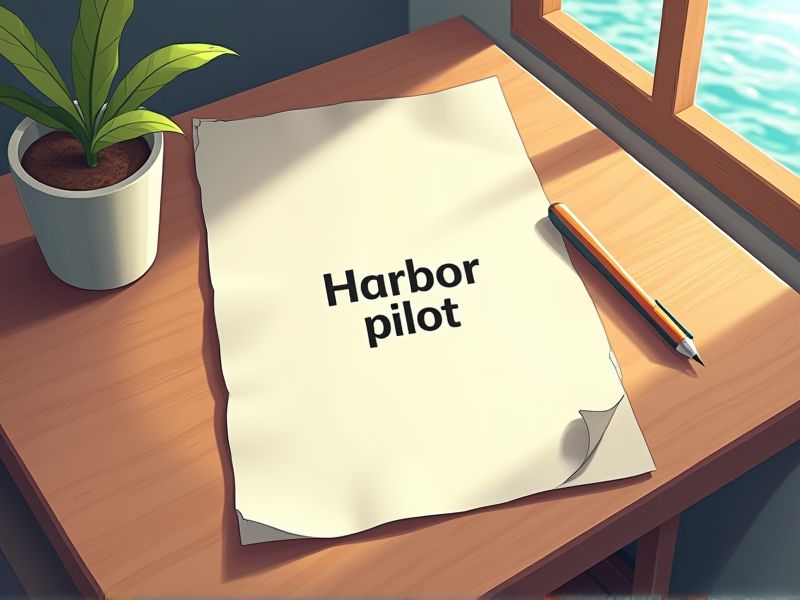
Harbor pilots play a critical role in ensuring the safe navigation of vessels through treacherous waters, which necessitates specialized knowledge and skills. Rigorous waterway conditions, complex ship handling, and varying weather patterns demand a pilot's precision and expertise. By obtaining specific certifications, harbor pilots prove their capability to manage intricate maritime operations effectively. Below are some important certifications that a harbor pilot may require.
Merchant Mariner Credential (MMC) with Harbor Pilot Endorsement
The Merchant Mariner Credential (MMC) with Harbor Pilot Endorsement ensures that a harbor pilot possesses the necessary qualifications and training to navigate vessels safely in confined waterways. Confirming a pilot's competence minimizes the risk of maritime accidents, thereby safeguarding both cargo and ecological environments. Regulatory compliance is achieved by holding this credential, as it aligns with international and national maritime standards. Completing the endorsement process supports standardization in training and skills, fostering trust among stakeholders in the maritime industry.
Harbor Pilot License/Certificate
A Harbor Pilot License or Certificate is necessary because it legally authorizes individuals to guide ships through challenging harbor conditions, minimizing the risk of accidents. Local waterways present unique navigation challenges, and pilots possess specialized knowledge of these, ensuring safe passage. Regulatory bodies mandate certification to uphold safety and operational standards within ports. This certification ensures a pilot possesses essential skills and adheres to international maritime regulations.
STCW Basic Safety Training Certificate
The STCW Basic Safety Training Certificate equips harbor pilots with essential safety skills to handle emergencies onboard vessels. This certification ensures that pilots possess the knowledge to prevent maritime accidents, reducing risk to both crew and environment. Compliance with STCW standards is mandatory for harbor pilots to meet international shipping and safety regulations. Increased proficiency in safety protocols fosters trust among shipping companies and enhances overall operational efficiency.
Advanced Firefighting (STCW) Certification
The Advanced Firefighting (STCW) Certification equips harbor pilots with essential skills to manage and coordinate firefighting efforts on vessels, reducing potential hazards and amplifying safety. Harbor pilots frequently encounter vessels of various sizes and cargo types, hence understanding fire dynamics ensures prompt and effective response to emergencies. Possessing such certification instills confidence in the pilot's ability to maintain vessel and crew safety during fire-related incidents. Regulatory compliance demands that personnel in critical maritime roles are adequately trained, promoting consistent safety standards across the industry.
Medical First Aid & CPR (STCW) Certification
Harbor pilots interact with diverse maritime environments where immediate medical attention may be required; the Medical First Aid & CPR (STCW) certification equips them with skills for initial care. Emergency situations at sea often place the harbor pilot as the first responder, making medical training crucial for effective response until advanced care arrives. The certification ensures compliance with international maritime safety standards, which enhances the overall safety and reliability of navigational operations. Harbor pilots encounter various injuries and health emergencies; possessing such certifications supports their ability to maintain health and safety on board.
Bridge Resource Management (BRM) Certification
The complexity of modern maritime operations necessitates Bridge Resource Management (BRM) Certification for harbor pilots to ensure efficient communication and decision-making among crew members. This certification empowers pilots with skills to manage human and technical resources effectively, critical for navigating congested port environments. BRM training reduces the likelihood of accidents by fostering teamwork and enhancing situational awareness. Standardized BRM practices across ports improve operational consistency and safety outcomes.
Electronic Chart Display and Information System (ECDIS) Certification
ECDIS Certification ensures a harbor pilot can accurately interpret and navigate digital nautical charts, reducing the risk of collision and grounding. Understanding ECDIS technology allows the pilot to make informed decisions quickly, crucial for managing the complexities of modern ports. Certification validates the pilot's proficiency in utilizing advanced tools, enhancing overall maritime safety. As shipping technology evolves, such expertise is increasingly vital for efficient and safe vessel operations.
Marine Radar & ARPA Operations Certification
Marine Radar & ARPA Operations Certification is crucial for harbor pilots as it ensures they have the skills to accurately interpret radar and automated radar plotting aids, enhancing navigational safety. Accurate interpretation and decision-making using these tools prevent collisions and groundings, reducing risk to vessels and the environment. Certification confirms that pilots can efficiently handle challenging conditions like poor visibility or high traffic, which are common in busy ports. Often, regulatory bodies mandate this certification to align with international safety standards, ensuring consistent competency levels among pilots worldwide.
Ship Handling & Maneuvering Course Certification
Harbor pilots require Ship Handling & Maneuvering Course Certification to ensure they have the necessary skills to safely navigate large vessels in confined port areas. This certification provides training on the complexities of different ship sizes, which is critical to preventing accidents and ensuring efficient port operations. Knowledge from the course helps pilots understand hydrodynamic effects and maneuvering strategies specific to each vessel type. Certification ensures the pilot's capability meets international safety standards, minimizing risks to personnel, cargo, and the marine environment.
Crisis Management & Emergency Procedures Certification
Crisis Management & Emergency Procedures Certification equips harbor pilots with crucial skills to effectively handle unforeseen maritime incidents, which reduces the risk of port closures and financial losses. Enhanced knowledge in emergency protocols ensures better coordination with emergency response teams, improving overall maritime safety. The certification fosters confidence in managing challenging situations like vessel collisions, safeguarding port infrastructure and environmental resources. By possessing this certification, harbor pilots gain a competitive advantage, meeting industry standards and boosting port operator confidence.
Summary
By obtaining certifications, you enhance trust and credibility with port authorities and shipping companies. This increased trust often leads to better job prospects and potentially higher pay. Certifications also provide you with updated knowledge and skills, improving operational safety and efficiency. The recognition gained from these qualifications can further expand your career opportunities in the maritime industry.
